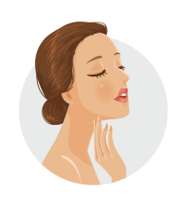15 Expert Tips to Prevent Dermatitis Flares
September 1, 2021 2025-04-23 12:4015 Expert Tips to Prevent Dermatitis Flares
As an Amazon associate, Dermatocare earns from valid purchase made by clicking on the affiliate links in this blog.

15 Expert Tips to Prevent Dermatitis Flares
“Doctor, when will my skin allergy get better? I’ve tried so many medications—even steroids—but the allergy or eczema always returns.”
This is one of the most common concerns raised by patients suffering from dermatitis.
The good news? There is a way to prevent the recurrence of allergic skin conditions. However, it requires consistent effort and adherence to a preventive skin care regimen. Below are 10 dermatologist-recommended tips that can help minimize or even eliminate flares of dermatitis or eczema.
🎥 Watch this video to understand the basics of eczema skin care.
Tip #1: Prevent Skin Dryness
Individuals with eczema or allergies often lack natural moisturizing factors, leading to a compromised skin barrier and increased sensitivity. Keeping the skin moisturized, supple, and well-oiled year-round is essential.
Best practices:
- Bathe in lukewarm water; avoid hot water as it strips natural oils.
- Limit bathing time.
- Use mild, fragrance-free soaps or cleansers that do not foam excessively.
- Choose mild shampoos, and rinse off thoroughly.
- Wear silicone gloves when handling detergents or cleaners.
- Pat skin dry gently using a soft towel—avoid rubbing.
- Apply moisturizer immediately on slightly damp skin to lock in moisture.
- Reapply moisturizer whenever skin feels dry, tight, or flaky—ideally, every 4 hours.
- Recommended usage: 250g/week for children, 500g/week for adults to minimize dependence on topical steroids.
Tip #2: Choose Cotton Fabrics
Textile choice directly impacts skin comfort and irritation potential.
Recommendations:
- Avoid rough fabrics like wool.
- Refrain from using synthetic materials like polyester and nylon.
- Wear loose-fitting, breathable cotton clothing.
- Remove tags or labels to prevent friction and irritation.
- Wash garments in fragrance-free detergents and rinse thoroughly.
Tip #3: Avoid Sudden Temperature Fluctuations
Abrupt shifts in temperature can stress sensitive skin.
Precautions:
- Do not enter an air-conditioned room immediately after being in heat.
- Switch off AC/fans a few minutes before stepping outdoors.
- Stay indoors during extreme weather conditions.
- In summer: wear cotton, and bathe after heavy sweating.
- In winter: layer with soft, insulating clothing.
- Use lukewarm baths throughout the year to help maintain skin equilibrium.
Tip #4: Identify and Avoid Allergens
Determining the cause of contact dermatitis is vital. Often, the location of the initial rash can provide clues to the allergen involved.
Refer to this article for guidance on identifying skin allergens based on rash distribution.
Tip #5: Minimize Scratching
Scratching aggravates inflammation and can lead to infection or scarring.
Strategies:
- Apply a moisturizer directly to itchy areas.
- Take antihistamines as prescribed.
- Keep nails short and clean.
- Use cotton gloves at night to reduce unconscious scratching.
Tip #6: Prevent Skin Infections
Proper hygiene during topical treatment application is essential.
Hygienic practices:
- Wash hands thoroughly before applying any skin medications.
- Keep emollient containers tightly closed after use.
- Scoop creams with a clean spoon, or use pump dispensers to reduce contamination.
Tip #7: Limit Pet Exposure
Animal dander is a common allergen. While difficult, avoiding pet exposure can significantly improve symptoms.
If you have pets:
- Vacuum frequently.
- Keep pets off beds and upholstered furniture.
Tip #8: Reduce Dust and Pollen Exposure
Both dust mites and pollen can trigger or worsen eczema.
Allergen-reduction tips:
- Use light cotton curtains; avoid heavy drapes.
- Vacuum carpets regularly.
- Prefer leather furniture over fabric-covered items.
- Use and frequently change cotton bed linens.
- Clean home with wet mopping to trap dust.
- Avoid stuffed toys, especially in children’s rooms.
- During pollen season, limit outdoor exposure and change clothes after returning indoors.
Tip #9: Prevent Mold (silan) Exposure
Molds thrive in damp, poorly ventilated environments and can be powerful eczema triggers.
Prevention guidelines:
- Avoid sitting in basements or poorly ventilated spaces.
- Let sunlight and fresh air into your living space regularly.
- Open windows and ensure cross-ventilation to prevent damp buildup.
Tip #10: Eliminate Allergy-Causing Foods
Some individuals have food-related triggers such as milk, peanuts, eggs, soy, or seafood.
Key advice:
- Avoid only those foods that have been clearly linked to flares.
- Never eliminate major food groups without professional confirmation of a food allergy.
Tip #11: Strengthen the Skin Barrier with Ceramide-Based Products
While moisturizing is essential, not all moisturizers are equal. Ceramides, cholesterol, and free fatty acids are naturally present in healthy skin but are often depleted in eczema.
Why it’s important:
- Ceramide-based creams mimic the skin’s natural lipids.
- They help repair and reinforce the barrier function.
- Reduce transepidermal water loss (TEWL) and increase tolerance to irritants.
Product types to consider:
- Ceramide-dominant emollients
- Lipid-replenishing balms
- Barrier repair creams (especially for hands and facial dermatitis)
Tip #12: Practice Allergen Rotation or Patch Testing
When dermatitis is persistent or relapsing, it may be due to an undiscovered contact allergen.
Recommended approach:
- Patch testing by a dermatologist can help identify hidden allergens like preservatives, fragrances, or even emulsifiers.
- Consider rotating skincare and cosmetic products every 3–6 months to avoid chronic sensitization.
- Keep a symptom diary noting flare-ups in relation to new products or environments.
Tip #13: Manage Stress and Sleep Regularly
Stress is an underrecognized but potent trigger for eczema flares, especially in adults and teenagers.
Helpful strategies:
- Practice mindfulness, meditation, or deep breathing exercises.
- Engage in regular physical activity to reduce systemic inflammation.
- Aim for 7–8 hours of quality sleep; poor sleep can worsen pruritus and barrier repair.
Studies have shown that stress increases cortisol, which disrupts the skin barrier and promotes itching, creating a vicious cycle.
Tip #14: Switch to Skin-Friendly Household Products
Household items like cleaners, detergents, dishwashing liquids, and even air fresheners often contain harsh chemicals, synthetic fragrances, and allergens that can trigger or worsen dermatitis.
Practical actions:
- Use hypoallergenic, fragrance-free detergents and cleansers.
- Avoid softeners, bleach, or antibacterial agents in laundry products.
- Prefer eco-labelled or dermatologically tested cleaning agents.
- Rinse clothes thoroughly to remove detergent residues.
- Wear protective gloves (with a cotton liner underneath if latex-sensitive) while cleaning.
Tip #15: Use Sun Protection Wisely
Though sun exposure can reduce inflammation in some eczema types, UV rays can also irritate sensitive skin or cause photodermatitis, especially in individuals using topical steroids or calcineurin inhibitors.
What to do:
- Use mineral-based sunscreens (zinc oxide or titanium dioxide) which are less irritating than chemical filters.
- Avoid sunscreens with added fragrance, alcohol, or essential oils.
- Apply sunscreen over moisturized skin and reapply every 2–3 hours if outdoors.
- Opt for protective clothing, hats, and umbrellas when feasible.
Conclusion: Prevention is the Key to Long-Term Relief
If you truly wish for your dermatitis to settle for life, treatment alone is not enough. You must proactively adopt the 15 preventive measures discussed above—tailoring them to your specific triggers and lifestyle.
For example, one of my patients had suffered from chronic hand dermatitis for over 10 years. Despite trying multiple treatments, her condition only improved significantly when she started wearing silicone gloves during kitchen work and other wet tasks. That simple change transformed her skin health.
So, take a moment to reflect:
Is your skin reacting to hair dye, perfume, artificial jewelry, or household cleaners?
What seemingly harmless habit might actually be your hidden trigger?
The path to healing often begins not in the prescription pad, but in identifying and saying goodbye to your unique irritants and allergens.
Your skin remembers—so protect it, respect it, and give it the consistency it deserves.
ROUTINE FINDER
Get free dermatologist-recommended regime by choosing your skin or concerns.

FACE

HAIRS

CHILD

BODY




